TV Is a Better Medium for Comedy than Movies, and What We Do in the Shadows Proves It

As summer fades, the fall TV line-up looms with new series debuts and the return of beloved fixtures. One of the most anticipated returning shows is FX’s What We Do in the Shadows, whose third season premieres Sept. 2. Shadows stands out amongst the pack not only in quality as one of today’s best sitcoms, but also in origin as the series is a spinoff of Taika Watiti and Jemaine Clement’s 2014 film of the same name. Like its predecessor, the TV version is a mockumentary style look into the modern lives of a few vampire roommates. The series has not only done its source material justice, but has arguably surpassed it. The fact that it’s probably now better known and loved than the film it’s based on is not terribly surprising, though. It has the significant advantage of being in a format better suited for comedy: TV.
As a medium, TV is a better vessel for comedy than film, while the opposite is true for drama. Let’s put it this way: dramas are like RPGs. They’re fueled by having a defined story with a beginning, middle, and end, and a clear path for people to move through. Comedy, meanwhile, is more like an open-world game, with more freedom for its characters to explore the various possibilities open to them, and thus more opportunity to grow as a result. Dramas benefit from the short, finite runtime of a movie or even a mini-series. With TV, dramas often lose all the tension and suspense that makes them compelling. Nobody thinks even for a second that the main character might die in a car accident when there’s 15 episodes left in a season, and no mystery is so complex that it can sustain the audience’s attention (and patience) for six seasons. By season two, we’ve already read every fan theory on the internet to the point that the eventual conclusion is doomed to underwhelm.
While movies often invoke a sense of urgency and grandeur, the laidback, episodic nature of TV is perfect for comedy as it is more character driven than plot based. It’s not their premises that makes them compelling, but rather the characters’s personalities, their interactions with each other, and the jokes that grow out of them. This is also why shows tend to hit their stride around seasons three or four after the characters are fully fleshed out and endeared to their audiences, allowing the writing staff to better tailor jokes specifically to them.
Most sitcoms can be summed up in a single sentence. The real purpose if their intentionally vague premises is to set the scene and establish the glue that holds its cast together, whether it’s neighbors/roommates, family, classmates, co-workers, or whatever ersatz family unit its characters form. Friends is a show about six twenty-somethings hanging out in New York, Bob’s Burgers is about a family that runs a restaurant, and The Office is simply about people who work at a paper company. These concepts do nothing more than to give these characters, who might not normally be drawn to each other, a reason to interact.
-

-

-

-

-

-

-

-

-

-

-

-

-

-

-

-

-

-

-

-

-

-

-

-

-

-

-

-

-

-

-

-

-

-

-

-

-

-

-

-








































